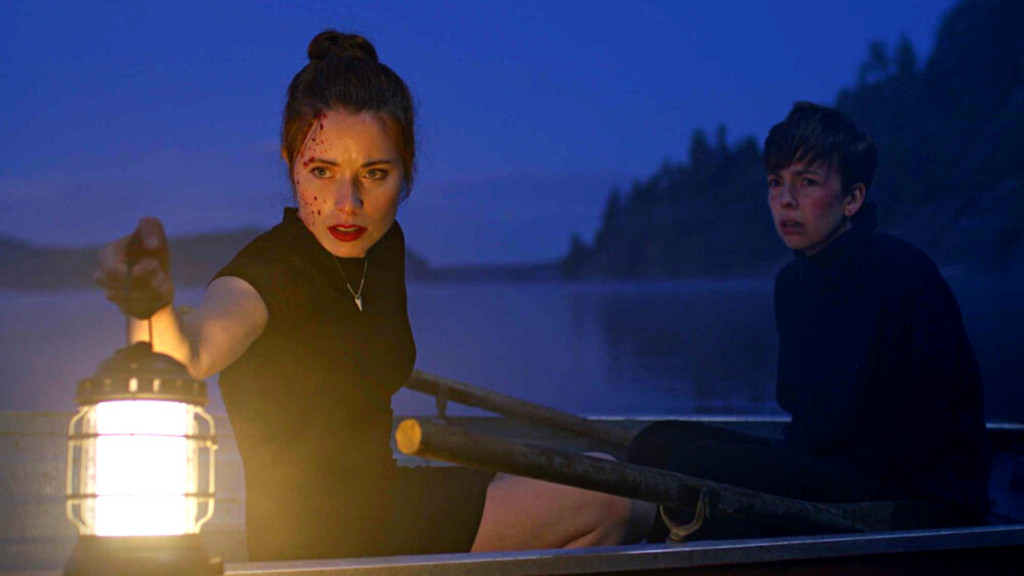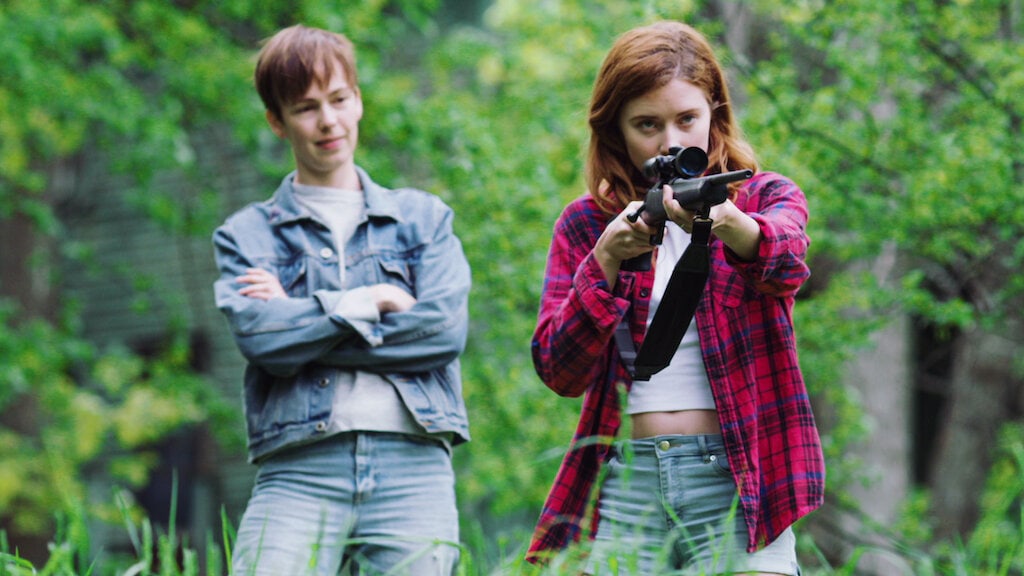
What Keeps You Alive wouldn’t have worked without its lesbian couple
Picture this: a young and happy couple heads to a remote, lake house to spend some time together for their first anniversary, only for it to turn into a nightmare of epic and terrifying proportions. That, dear reader, is the basic premise of What Keeps You Alive, and its lesbian couple is the heart of what makes it such a fascinating thriller.
Director Colin Minihan’s What Keeps You Alive tells the story of couple Jules (Brittany Allen) and Jackie (Hannah Emily Anderson), a married couple that celebrates their first anniversary at Jackie’s family home. Their life together seems perfect, if a little unsettling with how Jackie seems to stare off into the distance and sings songs about hunting people down, to the point that it feels like the film is pushing for a set-up of this weird and wacky couple being hunted by a deranged killer like in Halloween or Hush.
But then we meet Jackie’s old friend and neighbour, who quickly makes it clear that there’s something about Jackie that isn’t all that right and it’s not just because Jackie’s real name is actually Megan.
With all this weirdness going on, Jules spends the first part of What Keeps You Alive trying to find out where the truth of Megan begins and the deception of Jackie ends. Does she have a place in her wife’s life? Hell, who is her wife, really? Is the trauma of her past, alongside the combination of her being a queer woman, a reason for why Jackie is so secretive?
The answer doesn’t get any clearer for Jules until Jackie pushes her off a cliff, kickstarting a horrific game of cat and mouse with such unbearable tension that doesn’t let up right until the very end.
Throughout my time with What Keeps You Alive I couldn’t help but think hard about how, originally, Minihan had Hannah Emily Anderson’s role played by a male actor before that actor had to pull out. There’s no real emphasis on Jackie and Jules being in a same-sex relationship through the script, there’s never a moment where Jackie’s old friend looks questioningly at her for being with Jules, nor is there any dialogue that could be considered homophobic.
But it’d be a terrible misreading to say that queerness and gender doesn’t play a vital part in What Keeps You Alive. While distrust and deception is a big no-no in any relationship, Jackie’s betrayal of Jules at the very start of the film plays on a very genuine fear that most queer people experience: the reality that the person you love the most, who has most likely gone through the same trauma of feeling like they don’t belong in a heteronormative society, who you’ve connected with in that way, is actually someone you don’t really know. If Jackie was a man, it simply wouldn’t have worked as well.

Because of this queer connection between the couple, Jules attempts to reach Jackie make it feel all that more heartbreaking. As far as we’re led to believe in the film, Jules truly believed it was love at first sight with this wolf in sheep’s clothing, with Jackie inspiring her to do new and exciting things, often highlighted to the audience through artsy sepia/black-and-white flashbacks that make the fairytale past and horrific present clash.
Jules love for Jackie is something that is constant throughout the film, even when she finds out the truth about her murder-happy wife. At one point she asks Jackie if she ever really loved her or if it was all just a lie, where Jackie’s dull, muted response of ‘no’ is a slash at the heart and further conveys not just betrayal, but the rejection of the queer love the couple shared. Not only does it hurt, but it feels humiliating for Jules.
As for Jackie, she never feels as though she was originally a character that was intended to be male, and What Keeps You Alive is better off for it. She’s capable, destructive, and deadly, and she feels no shame when it comes to her kills, often adapting the speech of a lover in the throes of distress at the loss of her victim when faced with authorities, before slinking off the skin to show her real face: a predator through and through.
With Jackie and her relationship with Jules – as well as her many, many deceased wives – Minihan breaks through stereotypes often seen through fandom spaces: that queer love is pure and wholesome, nothing ever goes wrong and women, in particular, are the victims or the princesses. Instead, What Keeps You Alive shows that queer love can be just as soul-crushing and horrific as our heteronormative counterparts, full of deception and loathing and abuse. More importantly, Minihan conveys through Jackie that women can also hold destructive and murderous tendencies like all the male slashers we see in TV and film.
On queerness and gender, What Keeps You Alive is a hard thing to look at for anyone wanting a horror thriller where the two lesbians are in love with one another right until the very end, but it’s one that I encourage you to watch anyway…
What it has to say might just surprise you.
What Keeps You Alive is available to watch on Netflix.






